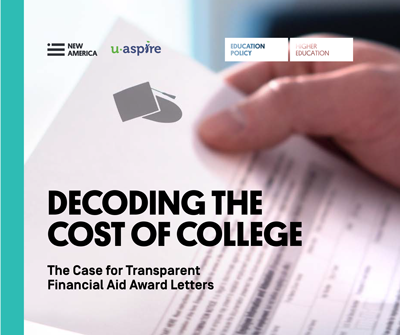Blogs
uAspire and New America Release “Decoding the Cost of College”
June 5, 2018
By Carrie Fethe

We believe that this research project is the first of its kind to be undertaken on this scope and scale. The quantitative data set of award letters, provided by uAspire, contains 11,257 letters from 910 colleges across 47 states. These letters represent 5,980 prospective students, many of whom went on to enroll in the 2016-17 academic year. Of these students, 74 percent were Pell Grant recipients, making our analysis focused on the low-income students likely to struggle the most when it comes to paying for college.
We found not only that financial aid is insufficient to cover the cost of college for many students, but also that award letters lack consistency and transparency. As a result, it is exceedingly difficult for students and families to make a financially-informed college decision. While solutions for tackling the cost barrier may be complex, solutions to improve award letter terminology and formatting are well within reach.
Students who receive a Pell Grant are still left to cover a significant gap—an average of nearly $12,000. The gap persisted even when students made cost-saving decisions about where to attend (public versus private colleges and universities) or where to live (at home versus on campus). Given that financial aid falls short, clear and consistent communication on award letters is critical.
After a thorough qualitative review using a subset of 515 award letters from unique institutions, we emerged with seven key findings:
- Confusing Jargon and Terminology
- Omission of the Cost
- No Clear Next Steps
- Inconsistent Bottom Line Calculations
- Vague Definitions and Poor Placement of Work-Study
- Misleading Packaging of Parent PLUS Loans
- Failure to Differentiate Types of Aid
Based on these findings, we present seven policy recommendations, calling on federal, state, and institutional parties to create systems-level change. Federal policymakers should conduct consumer testing, and then set and require award letter standards via federal mandate. State governments should adopt common award letter terms, calculations, and formats across their systems of higher education. Colleges and universities should develop more student-centered financial aid offers and tools, as well as align their efforts with other key departments serving student financial needs.
At uAspire, we plan to leverage this research and over 30 years of experience working directly with students, to advocate for these changes with policymakers in government and on the institutional level to ensure our country’s financial aid systems help rather than hinder students’ ability to earn a college degree.
Download full report